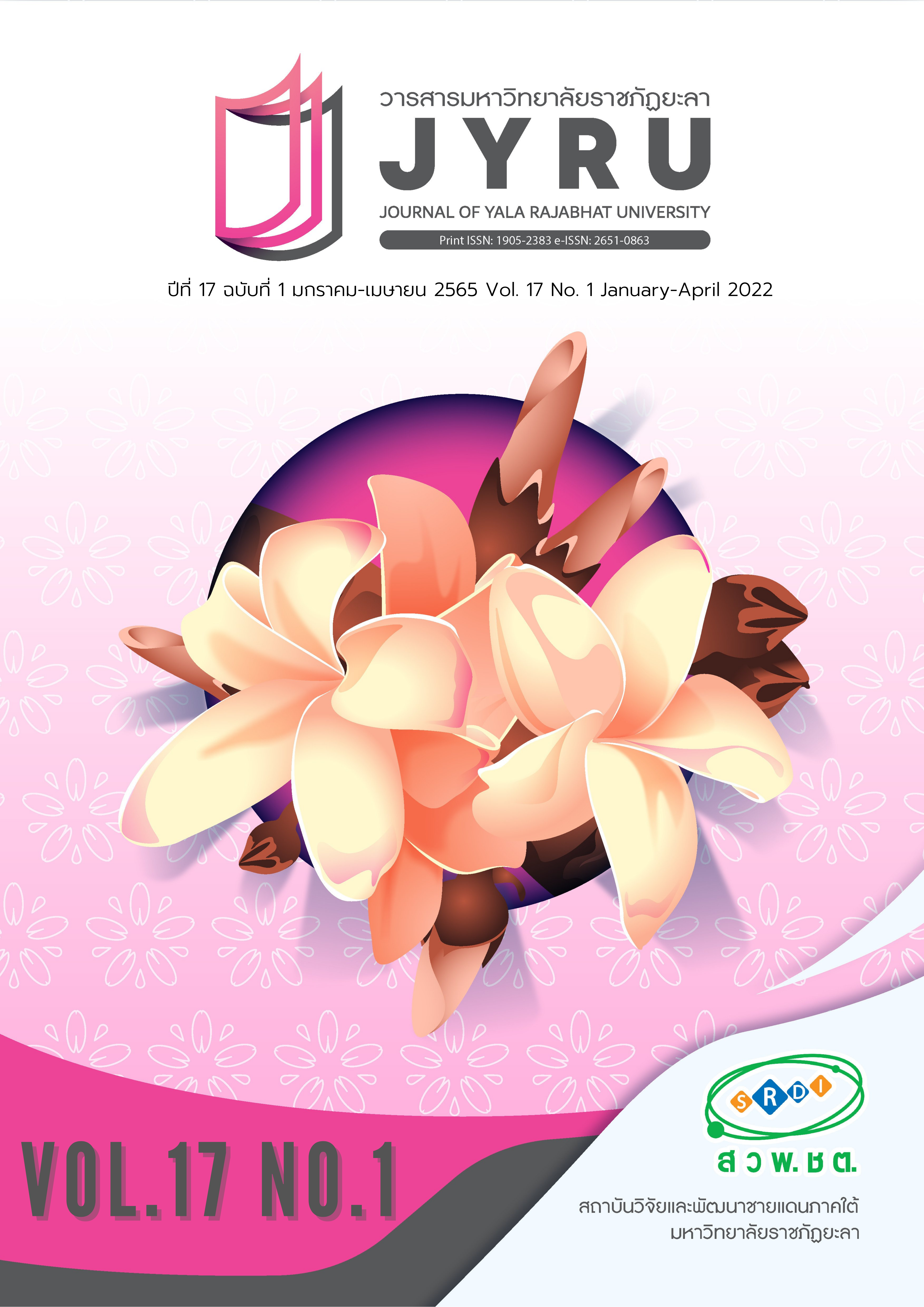[RETRACTED ARTICLE] แนวทางการจัดการการท่องเที่ยวเชิงสุขภาพเพื่อนักท่องเที่ยวผู้สูงอายุ
Main Article Content
บทคัดย่อ
จากสถานการณ์การแพร่ระบาดของเชื้อไวรัสโควิด-19 ในปัจจุบัน พบว่ากลุ่มนักท่องเที่ยวที่มีความเสี่ยงสูงมาก หากได้รับการติดเชื้อคือกลุ่มผู้สูงอายุ ซึ่งหลายประเทศทั่วโลกรวมถึงประเทศไทยกำลังก้าวเข้าสู่สังคมผู้สูงอายุ การให้ความสำคัญกับการจัดการการท่องเที่ยวเชิงสุขภาพให้มีความปลอดภัยและปลอดเชื้อ ควบคู่ไปกับความต้องการและพฤติกรรมของนักท่องเที่ยวถือเป็นหนึ่งภาระกิจที่ทุกภาคีจะต้องร่วมกันปรับเปลี่ยนรูปแบบการท่องเที่ยวให้แตกต่างจากอดีต หรือเรียกอีกอย่างว่า “การท่องเที่ยวนิวนอมอล (New Normal Tourism)” เพื่อเป็นเครื่องมือในการสร้างความเชื่อมั่นให้แก่นักท่องเที่ยว ทั้งช่วยผลักดันเศรษฐกิจของประเทศให้สามารถดำเนินต่อไปได้ ดังนั้นบทความวิชาการนี้จึงมีวัตถุประสงค์เพื่อเสนอแนะแนวทางการจัดการท่องเที่ยวเชิงสุขภาพเพื่อนักท่องเที่ยวผู้สูงอายุ จากการทบทวนและการสังเคราะห์งานวรรณกรรมที่เกี่ยวข้อง โดยบทความวิชาการนี้ได้นำเสนอเนื้อหา 4 ประเด็นหลัก คือ แนวคิดเกี่ยวกับนักท่องเที่ยวผู้สูงอายุ การท่องเที่ยวเชิงสุขภาพ การจัดการท่องเที่ยวเชิงสุขภาพ และแนวทางการจัดการการท่องเที่ยวเชิงสุขภาพสำหรับผู้สูงอายุ เพื่อให้หน่วยงานที่เกี่ยวข้องสามารถนำข้อมูลไปใช้เป็นแนวทางในการจัดการการท่องเที่ยวเชิงสุขภาพหลังยุคโควิด-19 ให้สามารถรักษาและดึงดูดนักท่องเที่ยวผู้สูงอายุให้เข้ามาเดินทางท่องเที่ยวในประเทศได้มากขึ้น อันจะนำไปสู่การท่องเที่ยวเชิงสุขภาพที่มีความมั่นคง มั่งคั่ง และยั่งยืนต่อไป
Article Details

อนุญาตภายใต้เงื่อนไข Creative Commons Attribution-NonCommercial-NoDerivatives 4.0 International License.
บทความ ข้อมูล เนื้อหา รูปภาพ ฯลฯ ที่ได้รับการเผยแพร่ในวารสารมหาวิทยาลัยราชภัฏยะลานี้ ถือเป็นลิขสิทธิ์ของวารสารมหาวิทยาลัยราชภัฏยะลา หากบุคคลหรือหน่วยงานใดต้องการนำทั้งหมดหรือส่วนหนึ่งส่วนใดไปเผยแพร่ต่อหรือกระทำการใดๆ จะต้องได้รับอนุญาตเป็นลายลักษณ์อักษรจากวารสารมหาวิทยาลัยราชภัฏยะลาก่อนเท่านั้น
เอกสารอ้างอิง
Ashton, A. S., & Klinhom, C. (2020). Wellness tourism development in the hotel industry: Tourist perspective. Journal of Tourism Quarterly, 2(3-4), 54-66.
Chuaikrut, C., Phusanam, A., & Dejmanee O. (2020). Factors affect to tourist behavior of Thai teenagers after invasion of Covid-19. NEU Acedemic and Research Journal, 10(3), 188-202. (in Thai)
Chulalongkorn University Intellectual Property Institute. (2017). Industry and technology trend analysis report: Tourism industry, good income and health tourism. Bangkok: Chulalongkorn University Intellectual Property Institute. (in Thai)
Keadplang, K. (2019). An increased business opportunity of wellness tourism as premium tourist destination in asian countries. Cultural Approach, 20(37), 102-109.
Krachangchom, S., & Sangkakorn, K. (2020). Behaviors and needs of Thai and foreign wellness tourists in upper north of Thailand. Journal Humanities and Social Sciences, University of the Thai Chamber of Commerce, 40(1), 57-76. (in Thai)
Kupkitaphun, K., & Bunjongmanee, P. (2020). The guidelines of health tourism development of European tourist in Prachuap Khiri Khan Province. Journal of Graduate Studies Valaya Alongkorn Rajabhat University, 14(1), 1-13. (in Thai)
Kwankatok, K. (2016). Elderly Recreation Center. Bachelor of Architecture Thesis. Graduate School, Sri Pratum University. (in Thai)
Leksuma, P., Dokchan, T., Udomsilp, M., Fakyen, A. & Cheimuangphan, N. (2018). The guideline of wellness tourism activities development in Western Thailand. Research and Development Journal, Loei Rajabhat University, 14(49), 20-30. (in Thai)
Ministry of Tourism and Sports. (2015). Thai Tourism Strategy 2015-2017. Bangkok: Ministry of Tourism and Sports. (in Thai)
Ministry of Tourism and Sports. (2016). Tourism Economic Review 2016. Bangkok: Excellent Business Management Company Limited. (in Thai)
National Senate Committee. (2015). The situation of the Thai elderly 2016. Bangkok: Foundation of Thai Gerontology Research and Development institute. (in Thai)
National Tourism Policy Board. (2017). The 2nd master plan for national tourism development (2017-2021). Bangkok: Office of Printing Affairs, the War Veterans Organization. (in Thai)
Office of the Permanent Secretary for Tourism and Sports. (2017). The project of tourism economic quarterly report 2017. Bangkok: Ministry of Tourism and Sports.
Rinsri, V. & Ngarmmesri, L. (2018). Public relations media affecting health tourism behavior of the elderly in Nakhon Sawan Province. Ph. D. in Social Sciences Journal, 8(3), 67-81. (in Thai)
Romanova, G., Vetitnev, A., & Dimanche, F. (2015). Health and wellness tourism. In Dimanche, F., & Andrades, L. (Eds.). Tourism in Russia: A management handbook (pp. 231-287). Bingley, West Yorkshire: Emerald Group Publishing.
Saribut S. & Assarat N. (2019). Market segmentation of new-age elderly Thai tourists for domestic tourism, Journal of Management Science Chiangrai Ratjabhat University, 14(2), 1-41.
Sombatpiboon, U., & Rabob C. (2020). Logistics management in health promotion tourism for elderly tourists in Samutprakarn Province. Journal of Social Synergy, 11(2), 25-36. (in Thai)
Teeranon, K. (2018). Thailand’s wellness tourism: Situation and potential towards competition of ASEAN region. FEU Academic Review, 2018(12), 22-34. (in Thai)
Ungchusak K. & Chunsuttiwat S. (2020). COVID-19 Thailand: Transition from “Semi-lockdown” to stability. Journal of Health Science, 29(2), 377-380.
Utami, P. A. S., & Prapti, N. K. G. (2020). Recreational activities and travel choices of the elderly. Indonesian journal of global health research, 2(2), 165-174.
Williams, C. C. (2021). Impacts of the coronavirus pandemic on Europe's tourism industry: Addressing tourism enterprises and workers in the undeclared economy. International Journal of Tourism Research, 23(1), 79-88.


